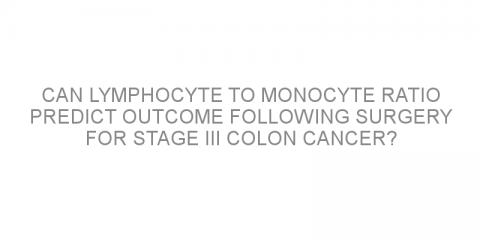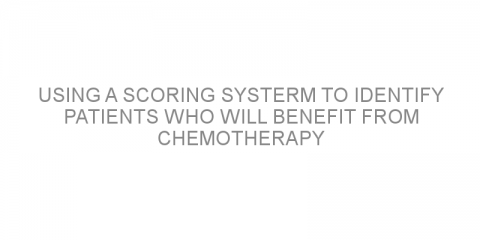In a nutshell This study reports the long term data on the use of panitimumab-FOLFIRI in metastatic colorectal cancer. Some background Many agents are now available for the treatment of metastatic colorectal cancer. FOLFIRI is a treatment method consisting of 5-flurouracil (slows or stops cell growth), leucovorin (Fusilev;...
Read MoreTreatment(s) now being considered-Chemotherapy Posts on Medivizor
Can lymphocyte to monocyte ratio predict outcome following surgery for stage III colon cancer?
In a nutshell This study evaluated the association between preoperative lymphocyte to monocyte ratio and time to recurrence and overall survival in colon cancer. Some background Surgery is the principle treatment option for advanced non-metastatic (has not spread to distant organs) colon cancer. 5-fluorouracil-based chemotherapy is the...
Read MoreIs delay of surgery after neo-adjuvant chemo-radiotherapy an effective treatment procedure?
In a nutshell The meta-analysis assessed whether a longer interval between the end of neo-adjuvant chemo-radiotherapy and surgery leads to better outcomes in treatment of rectal cancer. Some background Rectal cancer involves the final part of the large intestine, or rectum. The first choice for treatment of rectal cancer is usually surgery....
Read MoreA trial comparing three adjuvant chemotherapy regimens in the treatment of women with breast cancer
In a nutshell This study compared the effectiveness of three adjuvant chemotherapy regimens used in the treatment of node positive breast cancer. Some background Adjuvant chemotherapy refers to chemotherapy given in addition to surgery in an attempt to destroy any remaining cancer cells and to prevent cancer recurrence. Adjuvant chemotherapy is...
Read MoreEGFR Inhibitors in the treatment of non–small cell lung cancer patients
In a nutshell This meta-analysis (an analysis of data combined from several similar trials) examined the impact of EGFR tyrosine kinase inhibitors (TKI's) on progression-free survival (PFS) and the overall survival (OS) of advanced non small-cell lung cancer (NSCLC) patients. Some background Non-small-cell lung cancer (NSCLC) cells may contain...
Read MoreDisease-free survival in breast cancer patients is increased by adding paclitaxel to FAC chemotherapy
In a nutshell In this study researchers examined the effect of a specific chemotherapy combination on disease-free survival in patients with node negative breast cancer. FAC treatment was compared to FAC treatment plus paclitaxel (FACwP). Some background A combination of the drugs fluorouracil (efudex), doxorubicin (doxil), and cyclophosphamide...
Read MoreMaintenance chemotherapy compared to observation only for metastatic breast cancer patients after obtaining disease control with chemotherapy
In a nutshell This article looks at two treatment options for people who have obtained a complete, partial or stable state disease after first round combination chemotherapy for metastatic breast cancer. Some background Metastatic breast cancer is cancer that has spread from the breast to distant organs or tissues in the body. Treatment for...
Read MoreEvaluating the benefits of laparoscopy in determining the extent of peritoneal carcinomatosis for patients with colorectal cancer
In a nutshell This article evaluated whether the use of a minimally invasive diagnostic technique called laparoscopy before surgery to treat peritoneal carcinomatosis improves the selection of patients who can benefit the most from treatment. The authors of the study found that laparoscopy can be used to select patients for whom surgery may be a...
Read MoreCan a scoring system called a nomogram help develop a treatment program that is individual to each patient?
In a nutshell This article is a short editorial describing how the use of a “nomogram” (a predictive tool based on a points system) could provide a doctor and patient with possible outcomes if different treatment options are selected. Some background The current method of choosing treatment for patients with rectal cancer is fairly...
Read MoreThe use of genetic testing for selecting the best treatment for early-stage breast cancer
In a nutshell The aim of this article was to discuss the way in which the latest results on cancer DNA research apply to early-stage breast cancer. Genome analysis is highly likely to play a growing role in the future but more clinical trials are needed. Some background Breast cancer is a disease with multiple symptoms and consequences that are...
Read MoreDefining patients with a high risk of developing peritoneal carcinomatosis after curative surgery
In a nutshell The objective of this study was to identify risk factors predictive for developing peritoneal carcinomatosis (PC) after curative surgery for colorectal cancer (CRC). The data show three situations that could result in a real risk of recurrent PC: synchronous PC, synchronous isolated ovarian metastases and a perforated primary tumor. There...
Read MoreUsing a scoring systerm to identify patients who will benefit from chemotherapy
In a nutshell This paper looks at the use of a system called EPclin that gives patients a risk score according to the clinical and genetic characteristics of their tumor. This score is used to predict if patients are at high or low risk of distant reccurrence of the tumor and if they would benefit from chemotherapy. Some background...
Read More











